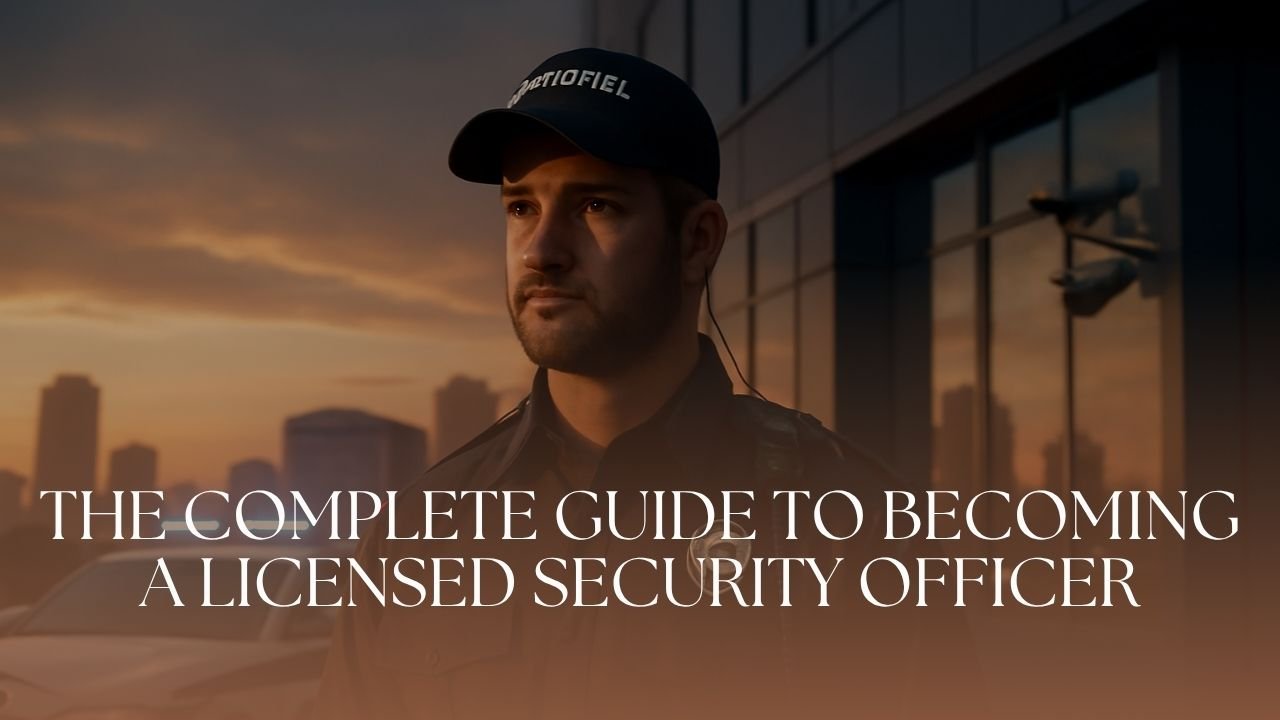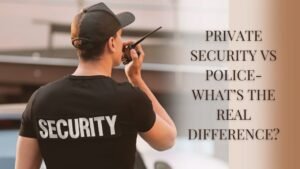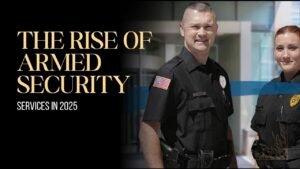In a world where safety is becoming more important than ever, the role of a licensed security officer has evolved into one of the most vital careers of the 21st century.
From protecting schools, offices, and malls to ensuring safety at events and critical infrastructure, security officers form the front line of defense for people and property.
Yet, many aspiring professionals are uncertain about how to get licensed, what qualifications they need, and what kind of career opportunities this field offers.
Licensing requirements vary from state to state, training programs differ, and the process can seem intimidating if you’re new to the industry.
This complete guide will walk you through every step of becoming a licensed security officer in the United States — from eligibility and education to exams, licensing, and career advancement.
Whether you’re planning to start as an unarmed officer or move up to an armed or specialized protection role, this article gives you all the knowledge you need to confidently enter the security profession.
What Does It Mean to Be a Licensed Security Officer?
A licensed security officer is a trained professional who has received authorization from a state or local government to perform duties related to the protection of people, assets, and property.
Being licensed means you’ve met legal standards in training, background checks, and moral integrity.
It allows you to work in private or corporate security roles — sometimes independently, sometimes under a company.
Security officers maintain order, prevent theft or vandalism, respond to emergencies, and report suspicious activity.
Depending on the license type, they may also carry firearms, patrol facilities, monitor surveillance systems, or handle crowd control.
A license is more than a card — it’s proof that you are trusted, qualified, and accountable for the safety of others.
Why Licensing Matters in the Security Industry
Licensing ensures professionalism, ethics, and accountability in a sector that deals directly with safety.
Without proper regulation, untrained individuals could pose more risk than protection. The licensing system ensures every officer:
- Meets minimum age, background, and training requirements
- Understands state and federal security laws
- Follows codes of conduct and ethical practices
- Has undergone psychological and character assessments
- Is trained in de-escalation, crisis response, and safety protocols
For employers and clients, hiring licensed officers builds trust and ensures compliance with state regulations.
For you as a professional, licensing provides credibility and long-term job security in a growing field.
Basic Eligibility Requirements
Although each U.S. state has its own licensing laws, most share a common foundation of eligibility criteria. Here are the typical requirements:
| Requirement | Description |
|---|---|
| Age | Must be at least 18 years old (21 for armed security) |
| Education | Minimum high school diploma or GED |
| Citizenship | U.S. citizen or legally authorized to work |
| Criminal Record | No felony convictions or serious misdemeanors |
| Physical Health | Must pass a medical or physical fitness assessment |
| Drug Screening | Required in many states before employment |
| Background Check | FBI or state-level fingerprinting and records check |
| English Proficiency | Basic reading, writing, and speaking skills |
Some states also require proof of moral character, professional references, or an interview with a licensing board before approval.
Types of Security Licenses
Security officer licenses are generally divided into three major categories. Your career goals will determine which path suits you best.
1. Unarmed Security Officer License
This is the most common license and is required for entry-level positions. Unarmed officers handle surveillance, crowd management, access control, and reporting incidents — but do not carry firearms.
Training focuses on observation, communication, and emergency response.
2. Armed Security Officer License
An armed license authorizes you to carry a firearm during duty. Requirements are stricter — you must complete firearm training, pass psychological evaluations, and demonstrate safe weapon handling.
Armed officers often work in banks, armored transport, government sites, or high-value private contracts.
3. Specialized or Executive Protection License
This license is for professionals working in bodyguard, VIP, event security, or corporate risk management roles.
Training often includes defensive tactics, first aid, counter-surveillance, and close-protection techniques.
Many officers transition into this category after gaining years of field experience.
Security Officer Training Requirements
Training is the backbone of your licensing journey. Each state mandates a certain number of hours and approved topics before issuing a license.
1. Pre-Assignment Training
Before working, you’ll usually complete 8 to 16 hours of classroom instruction covering:
- Legal powers and limitations
- Arrest and detention procedures
- Observation and reporting
- Emergency response and fire safety
- Crowd and traffic control
- Professional ethics and communication
- Report writing and documentation
This stage ensures you understand both your rights and responsibilities before you enter the field.
2. On-the-Job / Post-Assignment Training
Many states require additional hours after employment — typically 16–40 hours — where you learn practical, site-specific skills such as:
- Access control systems
- Alarm and CCTV monitoring
- Patrol techniques
- Conflict resolution
- Customer service in security roles
3. Firearms & Defensive Training (For Armed Officers)
For those seeking an armed license, you’ll undergo specialized instruction on:
- Firearms safety, handling, and maintenance
- State gun laws and use-of-force principles
- Marksmanship testing at a certified range
- Psychological fitness evaluation
- Annual requalification shooting tests
4. First Aid & Emergency Skills
Many employers prefer or require certifications in:
- First aid and CPR
- Automated External Defibrillator (AED) training
- Emergency evacuation procedures
These skills can save lives and boost your employability.
Examination & Certification
Once your training is complete, you must pass a written examination that tests your understanding of:
- Legal regulations
- Professional conduct
- Report writing and observation
- Conflict management
- Emergency procedures
In some states, this is followed by an oral or practical test, especially for armed roles.
After passing, you receive a certificate of completion, which becomes part of your license application package.
The Application Process
Applying for a security officer license involves several administrative steps. While details vary by state, most follow this pattern:
- Complete the application form — available online or at the state licensing division.
- Attach training certificates and course documentation.
- Provide fingerprints for an FBI or state background check.
- Submit a recent photo (passport-style).
- Include identification documents (driver’s license, SSN, or work permit).
- Pay applicable fees — usually between $50 and $200 depending on state and license type.
- Wait for approval — processing can take 2–8 weeks.
Some states may also request an interview or psychological screening for armed or executive protection roles.
Once approved, you’ll receive your license card or number, authorizing you to work legally in the security field.
Renewal and Continuing Education
Licensing doesn’t end at approval — maintaining it is equally important.
Most states require renewal every one to three years. To renew your license, you’ll need to:
- Complete a set number of continuing education (CE) hours
- Submit an updated background check
- Pay the renewal fee
- Requalify in firearms training (if armed)
Failing to renew before expiration can result in penalties or reapplication from scratch.
Ongoing education keeps officers up to date with changing laws, technologies, and best practices — a must in today’s evolving security landscape.
Working in Different States and Reciprocity
If you move or wish to work in multiple states, you must check reciprocity rules — these determine whether your existing license is recognized elsewhere.
Some states accept out-of-state training certificates if they meet similar standards, while others require a new license application.
For example, officers working in border regions often hold dual licenses to serve clients across multiple states. Always verify requirements early to avoid legal complications.
How Much Do Licensed Security Officers Earn?
Salary depends on experience, location, and license type. Here’s an approximate national overview:
| Position | Average Annual Salary (USD) | Typical Experience Required |
|---|---|---|
| Entry-Level Unarmed Officer | $32,000 – $40,000 | 0–2 years |
| Armed Security Officer | $40,000 – $55,000 | 1–3 years |
| Corporate Security Supervisor | $55,000 – $70,000 | 3–5 years |
| Executive Protection Agent | $75,000 – $100,000+ | 5+ years |
| Security Trainer / Consultant | $60,000 – $85,000 | 4+ years |
| Security Company Owner | $80,000 – $150,000+ | 5–10 years |
Wages rise with specialization, leadership, and high-risk assignments such as VIP protection, event management, or corporate security.
Essential Skills for a Successful Security Officer
While training provides technical knowledge, success in the field relies on soft and practical skills:
- Alertness: Always observe surroundings and identify threats early.
- Communication: Clear verbal and written communication is critical.
- Integrity: Trustworthiness is the foundation of the profession.
- Physical Fitness: Many duties require standing, patrolling, or responding quickly.
- Problem-Solving: Ability to think under pressure and make calm decisions.
- Teamwork: Coordinating with other officers, police, or emergency services.
- Conflict Management: De-escalating tense situations safely.
- Technical Skills: Understanding of CCTV, alarms, and access control systems.
Challenges in the Profession
While rewarding, the job comes with real challenges:
- Long Hours: Many officers work night shifts or rotating schedules.
- Risk Exposure: Dealing with aggressive individuals or high-crime areas.
- Legal Responsibility: Every action must comply with law and procedure.
- Emotional Stress: Handling emergencies and high-pressure scenarios.
Balancing professionalism and personal well-being is key to long-term success in this field.
Career Growth Opportunities
After getting licensed and gaining experience, you can pursue several advanced paths:
1. Supervisory and Management Roles
Move into leadership positions such as shift supervisor, operations manager, or security director.
2. Corporate Security & Risk Management
Large corporations hire security professionals for internal investigations, cyber threat management, and risk assessment.
3. Executive Protection
Provide personal protection for celebrities, politicians, and corporate executives.
4. Security Training & Education
Become a certified instructor or establish a security training academy.
5. Law Enforcement Transition
Your skills can be leveraged to move into police, homeland security, or federal protection roles.
6. Private Investigation or Consulting
Licensed security professionals often expand into private detective work or security consultancy.
Sample State Comparison
| State | Minimum Training Hours | Armed License Requirements | Renewal Period |
|---|---|---|---|
| California | 8 hrs pre-assignment + 16 hrs on-job | Firearms training & permit required | Every 2 years |
| New York | 8 hrs pre + 16 hrs on-job | 47-hour firearms training | Every 2 years |
| Florida | 40 hrs total | Additional 28-hour firearm course | Every 3 years |
| Texas | Level 2: 6 hrs, Level 3: 40 hrs | State firearms qualification required | Every 2 years |
| Maryland | 12 hrs unarmed | Separate handgun permit & test | Every 3 years |
Always verify details with your state licensing agency, as rules frequently update.
Government Resources for Licensing
For verified details and forms related to professional licensing, applicants can visit:
USA.gov – Licenses & Permits
This official site provides information on state and federal licensing requirements for various professions, including private security.
Becoming a licensed security officer is a process of discipline, training, and dedication — but it opens doors to a respected and stable career.
From entry-level guard work to high-end executive protection, this profession offers constant opportunities for growth and meaningful service.
By following the correct steps — meeting eligibility criteria, completing proper training, applying diligently, and maintaining your license — you build a foundation for a rewarding, long-term career in the safety and protection industry.
As security needs continue to rise across America, licensed officers remain essential protectors of communities, businesses, and public spaces.
With the right preparation, you can become one of them and make safety your profession.
FAQs
How long does it take to get a security officer license?
On average, it takes 4–8 weeks, depending on training completion, background check timelines, and state processing speed.
Can I apply with a criminal record?
Minor offenses may not automatically disqualify you. However, felony convictions, violent crimes, or dishonesty-related offenses usually prevent licensing. Some states allow appeals or conditional approvals.
Do I need a separate license to carry a firearm?
Yes. Armed officers must complete firearms training and certification in addition to the basic security license. Some states also require psychological evaluations and requalification tests.




